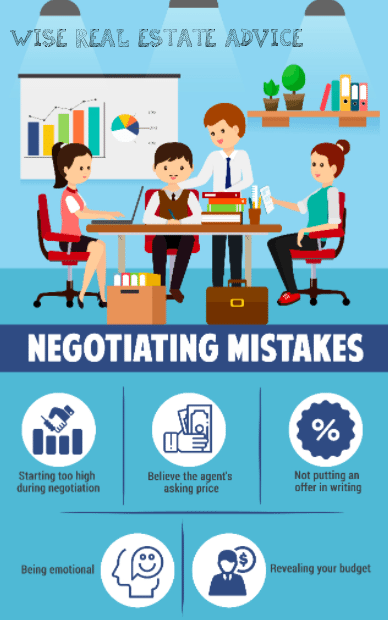When buying property, we all want to get the best price possible. But not everyone is a natural negotiator, and if you make mistakes while buying property, it can be costly. A vendor’s agent will work tirelessly for their vendor and secure the best price possible. Many buyers think the vendor’s agent is helping them, but the agent is focused on doing the right thing for the vendor only.
To ensure you’re getting the best price possible for a property you’re buying, you need to learn how to negotiate. These skills can take many years to acquire, but the more you study, you’ll learn to avoid some simple mistakes that will improve your chances of getting the best price possible.
Most people will only buy a property once or twice in their lifetime, so you may not get the opportunity to negotiate property often. However, if you look out for these six common mistakes by novice negotiators, you’re more likely not to get tripped up by them and negotiate a good deal.
Being emotional about the property
Falling in love with a property can be one of your biggest mistakes. You’ve looked around the house and can see yourself living here for the next twenty years; it’s the perfect place! Unfortunately, this thinking often means you’re willing to pay any price to secure the property.
Whenever you look into buying property, you need to leave your emotions aside. Have a clear picture of what the property is worth and remain steadfast about remaining under your budget. Buying property is an investment and needs to be treated as such. While it is ideal that you find a home that is perfect, many homes for sale can be negotiated down to a better selling price.
Buying a home that you plan on living in is always challenging as you’re looking at something you’ll own for many years. When making an offer, constantly remind yourself that this is precisely what the home is worth and try not to make an offer more than its actual value. Always remember that even if this home is perfect for you, there’ll be another one for sale soon, and you won’t miss out by sticking to your budget.
If you feel you can’t keep your emotions in check, then it may be best to secure the services of a buyer’s agent and have them find a property and negotiate on your behalf.
Not enough research on the current market
When people start looking at properties, they’ll often dive right in and not complete any market research. Reasons for this behaviour could be that people in Australia are used to fixed price items and not used to shopping around to determine the best price for a particular object.
If you’re looking at property in the window of a real estate agent, you’re only getting a glimpse of the market. Are you going to take their word for the value of the items they’re trying to sell? Many real estate agents are trying to get the best prices possible for their clients and may ask for more than a property’s current worth! If you have researched the area and know the selling and sold prices, you are better informed about the location and will find negotiating easier.
Having an educated opinion on the value of a property will allow you to negotiate more confidently. You can easily talk the price down, as you’ll be backed with evidence of recent sales and other properties on the market.
Only looking at one property
If you’re negotiating on a property and the agent knows you haven’t looked at many others, then it’s less likely they’ll budge much on the price. However, after looking at several properties, you may find the agent is more motivated to secure your bid, as there is every chance you’ll walk away from the deal.
When you are first interested in a property, let the agent know about one or two other properties you’re looking at in the area. Ideally, these other properties should be cheaper than the one they are selling. You can talk about these homes and why you think they may be better suited, and what the agent can offer.
Not only will having these other properties help you negotiate, but they can act as a good backup plan if the sale of the house you want doesn’t go ahead. Preparing to walk on a deal could be the agent’s push to determine if the vendors are keen to sell rather than see another buyer fall through the cracks.
Only making a verbal offer
The facts are that only a written offer will be taken seriously. When you make a verbal offer on a property, you do nothing more than show the real estate agent your hand. They’ll know precisely where you’re at and can use this information against you in the negotiation process.
If you’re firm about your offer, write it down, ideally on a contract of sale. This will tell the agent you’re firm on the price, and you may not be willing to move any further on the price.
Submitting a high offer
Working out the value of a property can be a tricky business. The worst thing you can do is wildly overvalue a property and place an offer. The vendor is likely to snap up this offer without hesitating.
The only time you’d likely need to place a high offer is when the property is heading to auction and you’d like to buy it without competing against others. Agents are often loathed to cancel auctions, as they can generate reasonable prices for their vendors, which results in a high commission. However, if they receive a reasonable price, they’ll likely take it to the vendor and accept it if they choose.
Making an offer on a property heading to auction can be tricky, so you must be cautious. Auctions are an excellent place to let emotions run wild, but if you’re prepared, you can buy property at a better price than you’d expect.










